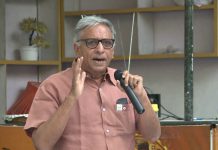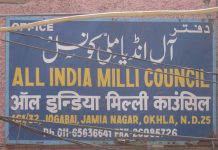New Delhi: The Indian education system is plagued with a number of issues, be it concerning accessibility, quality, equity, lack of humanity and values, discrimination, hate content, etc. Today, we are in need of an education system that would be erected on constitutional ethos and ensure that accessibility, quality and equity is ensured for all, along with the necessary improvement in curriculum and pedagogy that would ensure India‟s true progress in every way. We need an educational system that would engender critical thinking and research to improve human life and educational campuses that would be interactive spaces for productive critical discourses, discussions and dissent. The draft NEP – 2019 is rife with contradictions and exclusions. It breaks Constitutional structures and values, promotes commercialisation and politicizes educational system by centralising all aspects of it. In this regard a report, “NEP – 2019: Analysis & Recommendations” has been prepared in collaboration with the Students Islamic Organisation of India (SIO) and the Centre for Educational Research & Training (CERT) has been prepared and released analysing the draft NEP and makes recommendations to fix the issues with it.
1. Centralisation – Violation of Constitutional Values & Federalism of Indian Union:
References are made throughout the draft to the ancient Vedic education system, which was a model that promoted exclusion by limiting access to education to certain castes. Hence the policy must refrain from homogenising India‟s heritage as being representative of any religion or certain castes. If the policy intends to promote “Indian knowledge system”, it should encompass all contributions from different religious, regional, and linguistic communities who are inalienable part of the Indian knowledge tradition.
The RTE Act must be fully implemented. The draft NEP favours Sanskrit and Hindi, and wants to impose it over all citizens in gross violation of the Constitution. There should be a two-language formula, mother tongue and English, along with the option of studying a third language of either religious or cultural significance to the students as per Articles 29(1), 350A and 350B of the Constitution. For teaching languages of religious or cultural significance, institutions must be compulsorily required to make provision if 5 or more students so demand.
The proposed centralised bodies such as RSA, NTA, NRF, etc., under one command are against the federal structure of Indian Union. Such centralised bodies under one command will inevitably fall prey to the political expediency of ruling parties. Education has been in the State List and in the Concurrent List since the 42nd Amendment and hence these bodies will be in gross violation of Constitution.
The draft policy recognises the need for an evolving set of strict guidelines related to data analysis, to prevent misuse of the same. Nonetheless, it lacks clarity on the issues of privacy, or the laws and standards associated with data handling and protection. This must be addressed before any large-scale data collection, usage and storage related to teachers and students is implemented. The Right to Privacy judgment upheld privacy as a fundamental right under Articles 14, 19, 21 of the Indian Constitution. Considering this judgment, the draft policy should commit to strict and detailed privacy regime to ensure security and transparency in a democratic country. The draft NEP states that URG students will be tracked. There should be no tracking of URG students. Assessment should be conducted based on outcome parameters of the institutions alone and no specific data of any student must be collected, stored, or shared.
2. Commercialisation:
The policy takes a deeply contradictory approach towards the increasing commercialization of education in India. While the draft attests the „public good‟ nature of education, it does so while positing a commercialized form of education throughout the draft. It does not adhere to this assertion, both by failing to redact many of the existing measures which have led to commercialization, and by actively proposing a market model of education in the draft policy. Increasing commercialisation has lead to increase in corruptions such as “donations” and “capitation fees”, private contracts for syllabus textbooks must be abolished to prevent expensive retailing by private publishers, etc. Regularisation of educational institutions in terms of licensing and fee-capping of tuition and hostel fees must be ensured so that exploitation of students is prevented, and education is accessible to all.
The draft NEP betrays a homogeneous understanding of liberal arts education and has a market-oriented outlook for higher education. The recent history of India‟s education sector, particularly post liberalization- privatization-globalization has proven that focusing merely on enrolment has led to increased „massification‟ of higher education, while incurring social costs: affordability, equity, and quality. Without a substantive increase in government spending, and a commensurate emphasis on making education accessible and equitable, the target GER will aggravate the current situation of commercialization.
Going beyond vocational education and skill training, specific and comprehensive content to impart entrepreneurial education and skill set must be included in the curriculum at all levels of education. Democratic environment must be fostered in all HEIs. Apart from conducting regular and fair student union elections, campus environment must foster the values of constitutionalism, social justice and be nurturing spaces for dialogue, discussion, and dissent in a healthy manner.
The policy is silent on unionization of teaching and non-teaching staff. Many teachers find themselves unpaid, exploited, overworked, and subject to contractualism, with no grievance redressal or scope for direct communication with the management of educational institutions given the highly centralized nature. There should be adequate and democratic representation and participation of teaching and non-teaching staff in the decision-making process of educational institutions.
3. Accessibility & Equity in Education:
The policy is entirely silent on the question of children in distress and conflict, such as children in conflict with law, children who have been victims of trafficking and child labour, refugee children, children of tribal, nomadic and migrant communities and children born and raised in prisons with their mothers. This betrays a scant lack of respect to the question of access of education as well as that of the substantive implementation of right to education for all, not just for a few. The report gives detailed recommendations for all these categories of children and provisions must be made accordingly.
Scholarships for Minority Students must be granted on the basis of giving them equal opportunity to develop, otherwise it would further exclude some students and prioritise others. Similarly, in this era of rocketing inflation, the government should, at the very least, double the current amount given under various scholarships/fellowships/grants/schemes. Similarly, ease of access must be ensured by reducing the number of documents required and it should be made easier and free of cost to furnish them along with streamlining of the entire process.
New regulations of CBSE-UGC NET requirement for the Maulana Azad National Fellowship (MANF) for minorities and the Rajiv Gandhi National Fellowship (RGNF) for SCs and STs are reducing the accessibility of the intended beneficiaries to higher education. These regulations must be scrapped with immediate effect and the number of fellowships offered under them should be increased.
The National Commission for Minority Educational Institutes (NCMEI), a statutory body under the act of Parliament, must be strengthened and its affiliations must be recognised accordingly and enforced equally across the nation. Autonomous Madrasa Boards must be established under the National Commission for Minority Education Institutions (NCMEI) at state level with power to grant degrees and regulate and provide accreditation to Madrasa institutions in the respective states. The proposed Madrasa boards should design bridge courses to facilitate entry of Madrasa graduates into HEIs, in all streams of education. HEIs must be mandatorily required to offer these courses. All HEIs should commence Arabic and Islamic Studies courses.
The draft policy must be amended to include an unambiguous commitment to reservation in education. Reservation also must be extended to private HEIs, along with provisions for financial aid and reduced fees for students coming under the reserved category. Further, reservation must be given in the educational institutions – including 10% for Muslims and 5% for other minorities – for students as well as teachers, as per the Justice Ranganath Misra Commission. Reservation should also be extended to premier educational institutions such as IITs, IIMs, central universities and other HEIs.
While the draft speaks of ethical education and sensitization of schools, campuses, and all educational spaces, it fails to directly pinpoint the recurring pattern of hate and prejudicial content in syllabi across the nation. It briefly highlights the need to rectify biased representation of power balances in syllabi, but does not explicitly address the question of caste, religious or other forms of discriminations in textbooks. This is an alarming threat that must be promptly and decisively dealt with. Frequent changes and conflicting accounts in history have very adverse and enduring impact on students and threaten the harmony and social cohesion of India73. Extensive review of all textbooks in circulation and production should be carried out.
The Parliament must enact a legislation, to be named Rohit Act, to prevent systematic and institutional discrimination and atrocities against students of minority and marginalized sections in the educational institutions. Violence against minorities and SC/STs must be criminalised and made cognisable offense.
The following dignitaries attended the PC for release of the report:
• ET Mohammed Basheer, former Education Minister, Govt. of Kerala and MP, Ponnani constituency
• Syed Azharuddin, General Secretary, SIO of India
• Prof Madhu Prasad, RTE Activist
• Shyamolie Singh, Student Activist, JNU
• Ramees EK, Student Activist, JMI
• Syed Ahmed Muzakkir, Director, CERT

















